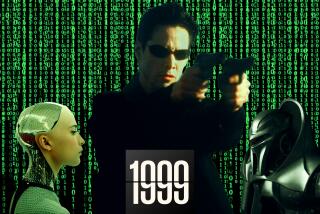Computer No Match for Its Creator
- Share via
Re “If a Machine Can Win at Chess, What Good Are We?” Commentary, Feb. 20: Gaby Wood misses the point. Computer-versus-mind chess matches only “prove” that a group of people can beat one person. One person skilled at chess was pitted against a machine conceived of, designed, built, programmed and refined by a group using the combined knowledge, experience and expertise of a number of specialists from a variety of fields. Some contest!
Viewed that way, Garry Kasparov’s performances against computers are remarkable. When a machine or group of machines with no human intervention or interaction performs all that a single human or a group of humans does, it will equal the achievements of “meat minds in skin sacks.” Is the real issue here the answer to the philosophical question: Which is “greater,” the creator or the created? It would be interesting to scatter a number of mainframe, desktop and laptop computers around to see what happens. That’s how we people got to where we are; it only took a few million years ... and we already have junkyards and landfills.
Horace Coleman
Long Beach
*
If people knew more about how computers play chess, I think there would be a lot less angst as to the superiority of computer “intelligence.”
When the computer sees the chessboard, it generates a representation of every possible move it can make. For each of these “possible future boards,” it then generates another batch of possible moves, and so on. Because a supercomputer like Deep Junior can process so many millions of possibilities per second, it can -- through sheer brute force -- “plan ahead” and make the right moves. But this is nothing like how a human plays chess, and Deep Junior wouldn’t be able to apply its chess intelligence in any general capacity ... so I think we humans are safe, for now.
David Morris
Berkeley


